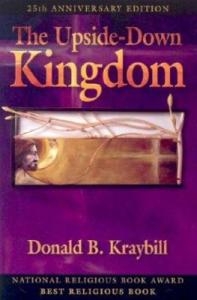The Upside-Down Kingdom, Chapter 7: Right-Side Up Detours
Whenever I read a chapter for discussion, especially if I’m leading the discussion, I try to locate THE paragraph that best expresses the point of the chapter. Here is one I chose for Chapter 7: “God’s love for us transforms our economic behavior. Mercy, not accumulation, becomes our new yardstick for measuring success. Generous giving replaces conspicuous consumption. God’s highest command forms the core of this upside-down way. Loving God with all our heart means loving our neighbor as much as ourselves. And this means caring, sharing, giving—valuing our neighbor’s welfare as much as our own. Care for our neighbor strips the old demons of their grip.”
Beyond this, in this chapter, Kraybill makes many specific suggestions about how Christians should view and “do” economics within our own lives and among ourselves. He doesn’t advocate state socialism but does talk about redistribution of wealth by Christians and among Christians (without limiting it to Christians).
For example, Kraybill suggests a “graduated tithe” — less than ten percent given by those who have little to give and more than that by those who have much to give. I have a standard answer when someone asks me about tithing: “More if possible, less if necessary.” And we both (Kraybill and I) MEAN giving to the needy. Not necessarily cash, but giving what will actually help them. My own preference is to give to the poor and needy through an accountable and accredited Christian charity such as World Vision or World Relief or The Salvation Army or Volunteers of America. (One way to check accountability is to see if the charity is a member of the Evangelical Council for Financial Accountability.
Some readers and commenters here have demanded specific answers about how the preferential option for the poor should be administered. We will see if Kraybill answers that. However, generally speaking, I want to remind everyone that Kraybill is interested in principles more than mechanics. He is writing mainly to people who WANT to live the “upside-down way,” offering principles and suggestions.
But I think he is also arguing that churches should preach and teach the upside-down way and even hold members accountable who live a different way—according to “the world’s” principles and customs (e.g., selfish gain, hoarding, etc.).
Kraybill also suggests that Christian business people and employers should charge less than possible for their goods and services and pay more than necessary to their workers.
Kraybill doesn’t go nearly as far as Walter Rauschenbusch did a century ago. Rauschenbusch believed that capitalism is evil and that Christians who go into business should set their businesses up as cooperatives rather than as for profit-making enterprises.
Much of this chapter deals with what Kraybill calls “detours” by which he means people, normally Christians, misusing scripture passages to avoid giving to the poor. He discusses the old canard of “The poor you will always have with you”—as a reason not to fight against poverty. And in that case and others he argues that these passages are misunderstood by those who are opposed to redistribution of wealth and attempts to abolish poverty.
So, finally, a “tale of two churches.” Is served as youth pastor at a moderate-sized mainline Protestant church in one of the poorest neighborhoods in a major American city. The church was surrounded by large old houses inhabited mostly immigrants to the U.S. from “south of the border.” When I was assigned to organize the church’s annual summer Vacation Bible School I was told by the consistory not to go around the neighborhood invited neighborhood children to VBS. The reason given was that they were unmannered and unruly and they might break something. I did it anyway. I walked around the neighborhood inviting families to send their children to VBS.
One five year old immigrant boy who spoke no English did accidentally put his hand through a small glass window pane in a door. He cut his hand and I went around the neighborhood asking everyone I could find whose child he was. I could not find his family. So I took him to the ER of the nearby hospital where they would not treat him in spite of the fairly severe cuts to his hand. We sat in the ER waiting room for hours while others from the church searched for his parents. Finally they were found and came to the ER and signed the necessary papers for him to get stitched up. Then I was soundly chastised by the consistory. I simply asked them what Jesus would do. I survived the chastisement. I should say that almost nobody in that congregation lived in that neighborhood and some people in the congregation opposed our “housing” the food pantry supported by several neighborhood churches. But we did house it anyway, partly at my insistence.
A different church, years later. Much smaller church but with a sizable building. The church participated in an inter-church project that housed homeless mothers and children. Two nights (in a row) per month our church took them in overnight, fed them, clothed them, played with the children, and stayed with them. We made sure they had shelter before leaving. We worked with the city, county and state as well as most churches in the city. Everyone in the church took turns setting up, supplying food, bringing blankets and clothes, etc., and staying overnight with the mothers and children. (We did not refuse fathers but they rarely came.)
Which church was at least making an effort to live the upside-down way of Jesus?
*Note: If you choose to comment, make sure your comment is relatively brief (no more than 100 words), on topic, addressed to me, civil and respectful (not hostile or argumentative), and devoid of pictures or links.*














